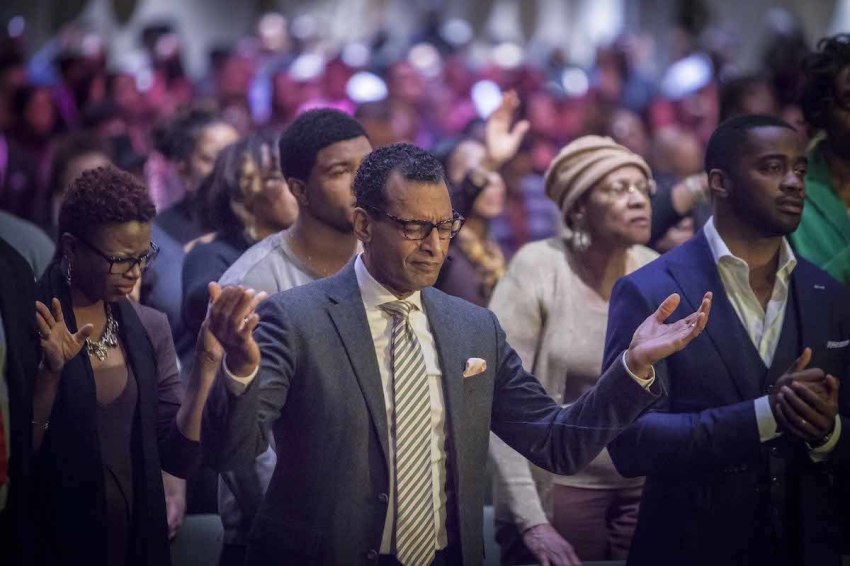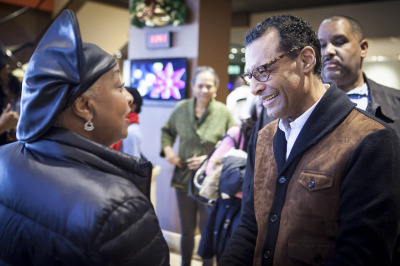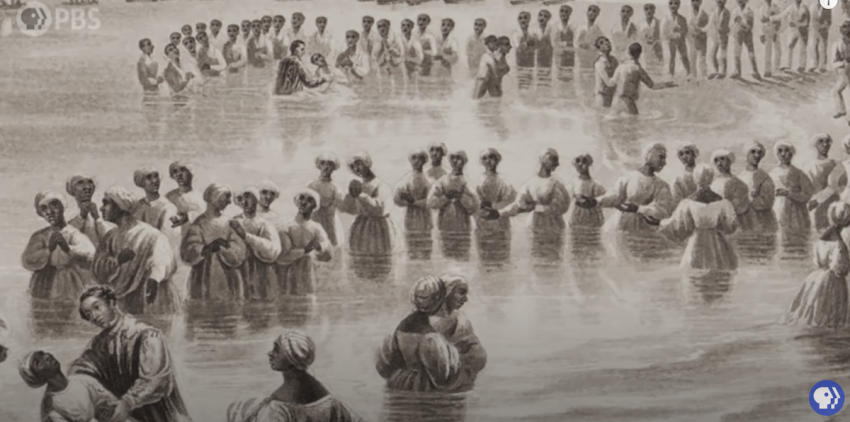AR Bernard on how the black church informed the fight for freedom and equality in America

The black church has a long and complex history that has served as a catalyst for the improvement of the black experience in the United States since its formation in times of slavery, according to New York City megachurch Pastor A.R. Bernard.
The traditions of the black church are largely shaped by a history of African American suffering. And despite the advances made over time when it comes to the rights of black Americans that are largely spurred by black Christian movements, there is still much work to be done.
Bernard, the head of the 40,000-member Christian Cultural Center in Brooklyn, a respected community leader who has served as an adviser to mayors and presidents, spoke with The Christian Post in an in-depth interview focusing on the history of the black church and its impact on American life.
Discussing everything from slavery, segregation, and the Civil Rights Movement to the more recent social justice protests and the African influences on black church culture, Bernard sees many areas where the black church's footprint has left a mark in society.
"For some 200 years of slavery, followed by another 150 years of legalized segregation, it made the black church part of the creative survival of blacks in America,” he said.
'Black people are not monolithic'
Bernard, an Afro-Latino born in Panama to a white Spaniard father and a mother of black descendants from Africa, who were brought to Central America, says his worldview was shaped by being a black man growing up in America.
"When I think about blackness and black identity, I'm talking and thinking about the African diaspora to North, Central and South America. That whole displacement, that whole experience, that is how I identify as such,” the 67-year-old pastor said.
“It's unfortunate that we live in a world that forces us to sometimes defend or navigate identities.”
The esteemed minister referenced Dr. Martin Luther King Jr.'s 1963 “I Have A Dream” speech. Although he said the country still has some way to go before men are judged by the content of their character and not their skin color, Bernard believes America has made some progress in the last 60 years.
“We still have a long way to go,” Bernard said, adding that for true equality to take place, people must refrain from having a one-dimensional view of the black community.
"Black people are not monolithic. We're very diverse, all different shades, textures of hair, and facial features,” he detailed.

Bernard leads a culturally diverse congregation at the edge of Starrett City in Brooklyn. The 96,000-square-foot megachurch he built over 20 years ago draws parishioners from all five boroughs of New York City whose backgrounds range from Central America, South America, the Caribbean, and Latin, African, and Asian descent.
“It's quite a mixture of people of color,” he shared. “In our church, when we say that we're a multicultural church [and] becoming more and more racially diverse, [it’s] because each church is contextual and reflects the community or should reflect the community that it's in.”
"The black community, if we can use that term, is not monolithic. It is quite diverse,” he reiterated. “What is true for the black community as a whole is also true for the black religious experience. It is not monolithic. However, the black church and its many distinctive expressions are a significant part of the American experience. It has impacted the spiritual, social, economic, educational, and political life of America.”
The impact can be seen by looking back at the Civil Rights Movement of the 1950s and '60s. Bernard pointed to how the black church has influenced and shaped laws and policies as well as structural changes within systems.
Ordained under the Church of God in Christ denomination, Bernard said even black denominations each have a “very diverse experience.”
Statistically, black churches would consist of denominational churches from the African Methodist Episcopal Church or the Church of God in Christ.
According to a Pew Research Center survey released this month, 60% of black adults who go to church say they attend religious services at a predominantly black church. Meanwhile, 25% say they attend houses of worship with multiracial congregations. Another study found that African Americans are measurably more religious than the overall U.S. population.
“We're spread out. It's quite diverse but tends to be quite consistent. So when you read or hear of some of the analyses, based upon data accumulated [by some widely cited surveys], it doesn't fully reflect the black church experience, because it's very specific in terms of its experience here in America,” he explained. "It includes levels of church affiliation, church attendance, the regular practice of prayer, and the importance of religion in one's personal life and in one's family life. All of that is very real and measurable.”
Faith formed in slavery and segregation
Bernard attributed black believers' dedication to God and faith in America to the African worldview.
When Africans were brought to the Americas as slaves, they brought a worldview that was already established within African culture, he said.
"That is a worldview that embraces the sacredness of the universe, of creation. That's what they call ancestral worship, but it's actually ancestral respect,” he added. “When you dig deep, and sociologists have found this in African culture, that essentially regardless of practices and traditions, they all believe in one, what they call Father God.”
Bernard called the sacredness of the universe and creation as an underpinning for their conversion to Christianity because of a similar worldview.
"Their conversion during slavery and after slavery in America, and even in their conversion to Christianity, blacks created a parallel religious culture,” Bernard said. “They didn't just imitate white Christianity. They chose some of their own cultural traditions and experiences and practices and customs, in their worship.”
"The black church experience was very ecstatic, the kind of spiritual experience of the presence of God that we see in the Pentecostal church and charismatic churches as well, especially black Pentecostal and charismatic churches. This was all part of its growth and development,” Bernard expounded.
“They developed their own hymns, their own music style, preaching style, their own styles of worship.”

Much of the black church experience was formed during captivity in slavery.
The original hymn “Wade in the Water” was used as a signal and message to others. Harriet Tubman used the song to tell escaping slaves to get off the escape trail to refrain from getting captured. A look at the historical context of some hymns in gospel music showed how the music was related to slavery and the slave experience.
"For some 200 years of slavery, followed by another 150 years of legalized segregation, it made the black church part of the creative survival of blacks in America,” Bernard said of one of the reasons art and music are an integral part of the black church.
“They were able to relate to stories like the Exodus story because of their own captivity. They were able to relate to the Old Testament image of God [as an] avenger of injustice, a conqueror and a liberator. That influenced and informed the black struggle for freedom, justice and equality in American captivity.”
In the new PBS documentary "The Black Church," Henry Louis Gates Jr. takes a closer look at the roots of African American faith traditions, beginning with the trans-Atlantic slave trade and the way those enslaved held on to and adapted their faith practices from the brutality of slavery to emancipation.
Bernard, now a spiritual adviser to celebrities such as Denzel Washington and former pro-basketball player Alonzo Mourning, got his religious start in the Nation of Islam.
While a Nation of Islam follower and teenage civil rights activist, Bernard came to his faith in Jesus Christ after listening to Nicky Cruz, a former New York City gang member turned evangelist. According to The New York Times, Bernard went from “heavy black radical activism” to embracing Jesus.
In his interview with CP (watch below), the pastor said that one of his heroes was professor C. Eric Lincoln, a black scholar who wrote the sociological book,The Black Church Since Frazier.
"I was introduced to him because he wrote what I considered the definitive work on the Nation of Islam. It was called The Black Muslim movement in America. He wrote it back in the 1960s,” the pastor said.
“He presented the Nation of Islam, not so much as a religion, but as a protest movement against the failure of the white Christian church to address the socio-economic plight of blacks in this country.”
Lincoln and Bernard were gearing up to write a book together about “the history of God and humanity,” but the author died before that collaboration would come to pass.
However, Bernard said he wholeheartedly agrees with Lincoln’s teaching that “the holocaust of slavery, and the notion of divine rescue, colored the theological perception of the black laity, the themes of black preaching in a very decisive manner.”
"A lot of the sermons that were preached about black progress and black struggle and the suffering of Jesus, they could identify with the suffering, death and then the triumphal resurrection of Jesus,” Bernard said, pointing to how slaves embraced the Gospel story.
“It gave them a sense of hope in the midst of a hopeless situation. They very quickly translated the whole hope of Heaven to the hope of the hero now because of the Exodus story. It was more than just waiting to get to Heaven to get out of slavery. No, this God will make a difference in the here and now, the life that we now experience.”
The spiritual leader said that to this day, black Christians “still look for God’s personal involvement in human history."
“Especially their experience in American history, we are still believing that God is going to do something to continue changing the issues that we have to face,” he said. “The reality is that they're still inequities in American society.”
Bernard listed “racialized policing, racialized criminal justice systems, racialized immigration systems, inequities in education, inequities in economic opportunity” as some of the issues that still need to be addressed in the U.S.
He said the Bible empowered people of color to agree with the biblical declaration that “all human beings are created in the image of God,” and establishing a relationship with Jesus would reconcile sinners back into the family of God.
“That affirmed the humanity of a people who were once considered in this nation, three-fifths human. We weren't considered fully human beings. It's that issue of the humanity of black life that has been at the forefront of the struggle,” Bernard maintained.
The Christian leader, who had met with the last two popes and the prime minister of Israel when he visited New York for the first time, said that the black church was central to the Civil Rights Movement.
“Dr. King, he was a pastor [of] Dexter Avenue King Memorial Baptist Church ... and then Ebenezer [Baptist Church in Atlanta]. He was a pastor,” Bernard recalled. “I was in a meeting yesterday with his daughter Dr. Bernice King. And we were talking about some of these issues of faith and prejudice. She was saying that her father believed himself to be a pastor most of all.”
Bernard said that when King emerged on the national scene, he saw himself to be a “pastor of the nation” and a “shepherd that was engaged in shepherding American society by appealing to Americans' conscience.”
According to the pastor, King shepherded Americans “into a place of accepting black people and black life as human” and “accepting the dignity of that black life and allowing it to assimilate.”
“Of course, the black church played such a role in all of this,” he said.
"You got to see the black church as the only stable black institution that emerged out of slavery.”



























